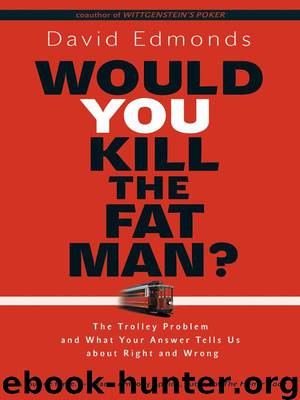Would You Kill the Fat Man?: The Trolley Problem and What Your Answer Tells Us about Right and Wrong by David Edmonds

Author:David Edmonds [Edmonds, David]
Language: eng
Format: epub
Publisher: Princeton University Press
Born Moral
How is it that we recognize that the sentence “runaway trolleys that are stationary smell morbidly” is a grammatical sentence, though nonsense, but “stationary smell are runaway trolleys that morbid” is not?
Noam Chomsky made his academic reputation through his pioneering work in linguistics in the 1950s and ’60s. He asserted that the language instinct was innate. “Colourless green ideas sleep furiously” is a grammatical sentence. It’s a well-formed sentence in syntactical terms. “Furiously sleep ideas green colourless” is not. We have an instinctive grasp for what’s grammatically permissible in language and what isn’t.
What struck Chomsky was that normal children acquire language remarkably easily, following rules that they are often not explicitly taught. Not only do they rapidly learn to distinguish grammatical from nongrammatical sentences, but they soon grasp other vital skills of the language user, such as the ability to identify contradictions or ambiguities. From a finite set of words and phrases they are able to construct an infinite number of sentences. None of this would be possible, argued Chomsky, unless we were somehow programmed to speak a language.
This program, or recipe, must be of a very general kind. A baby born in Guangzhou will grow up to speak Cantonese, a baby born in Budapest will learn Hungarian, and a baby born in Glasgow will speak English (though in an accent impenetrable to some fellow citizens). On the face of it, Chinese, Hungarian, and English have little in common. Nonetheless, said Chomsky, all these languages must share some kind of common structure.
Once children can speak a language, they develop strong and reliable and rapid instincts for what is linguistically kosher and what isn’t. Strangely, however, language users cannot always justify their intuitions. They seem to follow rules subconsciously. Take the following example: most native English speakers would not say, “The black, terrifying, large trolley was out of control.” That sounds a bit wrong, linguistically off-key. They would be more likely to say, instead, “The terrifying, large, black trolley was out of control.” But why is the latter word order the correct one? Most people would struggle to give an instant response. In fact, they’d probably struggle to give an accurate response even given time to reflect on the matter.2 The rules we’ve somehow absorbed are Byzantine. In “Colourless green ideas sleep furiously,” we must know that “adjective, adjective, noun, verb, adverb” is a pattern that works, whereas its opposite, “adverb, verb, noun, adjective, adjective” does not.
In the 1990s, one of Chomsky’s graduate students at the Massachusetts Institute of Technology, John Mikhail, wondered whether the linguistic model could be transposed to morality—and set about testing parallels with examples from trolleyology.
If there was a strong parallel, then children might be expected to have the same intuitions about the trolley cases as adults. And this is exactly what Mikhail found. He follows the psychologist Jonathan Haidt in describing children as “intuitive lawyers,” although for Mikhail, a legal scholar, this is a positive description, while for Haidt it is a term of gentle mockery.
Download
This site does not store any files on its server. We only index and link to content provided by other sites. Please contact the content providers to delete copyright contents if any and email us, we'll remove relevant links or contents immediately.
The Art of Thinking Clearly by Rolf Dobelli(10451)
The 5 Love Languages: The Secret to Love That Lasts by Gary Chapman(9784)
Mindhunter: Inside the FBI's Elite Serial Crime Unit by John E. Douglas & Mark Olshaker(9318)
Becoming Supernatural by Dr. Joe Dispenza(8199)
Nudge - Improving Decisions about Health, Wealth, and Happiness by Thaler Sunstein(7690)
The Road Less Traveled by M. Scott Peck(7593)
Mastermind: How to Think Like Sherlock Holmes by Maria Konnikova(7320)
Enlightenment Now: The Case for Reason, Science, Humanism, and Progress by Steven Pinker(7306)
Win Bigly by Scott Adams(7183)
The Way of Zen by Alan W. Watts(6600)
Factfulness: Ten Reasons We're Wrong About the World – and Why Things Are Better Than You Think by Hans Rosling(4731)
The State of Affairs by Esther Perel(4711)
Gerald's Game by Stephen King(4641)
Man's Search for Meaning by Viktor Frankl(4580)
The Confidence Code by Katty Kay(4251)
Thinking in Bets by Annie Duke(4218)
The Healing Self by Deepak Chopra(3568)
Hidden Persuasion: 33 psychological influence techniques in advertising by Marc Andrews & Matthijs van Leeuwen & Rick van Baaren(3552)
The Worm at the Core by Sheldon Solomon(3485)
